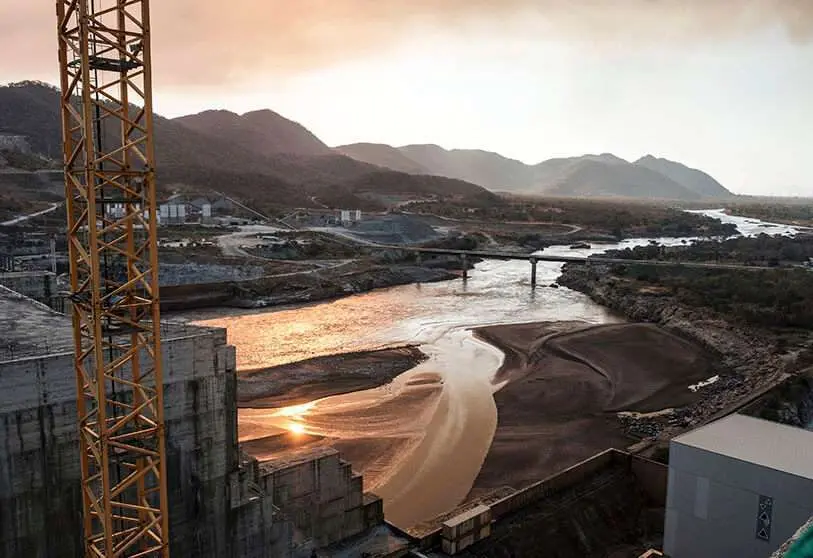The inevitable confrontation over the waters of the Nile

Almost silently, Ethiopia completed the first partial filling of its Great Dam of the Renaissance (GERD), but with the jubilation of its 109 million inhabitants, the mistrust of Sudan and the manifest hostility of Egypt. The collection of the first cubic hectometres of what will be the biggest dam in Africa and the seventh in the world was attributed by the Ethiopian prime minister to the heavy rainfall the sky has rewarded the country with this year, which has caused major and serious flooding in Sudan. In view of the lack of agreement between the three countries on this and many other technical aspects related to the dam, the Ethiopian prime minister, Abiy Ahmed, used this meteorological phenomenon as a justification for the first major containment of water on the Blue Nile, the main tributary of the Nile, which contributes 86 percent of the river's total flow.
Almost all the negotiations held so far have ended without agreement, and an open confrontation between interests that clash head-on seems increasingly close. Egypt has always opposed the building of this dam, and has always relied on the Water Agreements of 1959, signed during the British colonisation, which stipulated that 75% of the present and future waters of the Nile belonged to Egypt and 25% to Sudan. According to this document, the countries through which the White Nile and the Blue Nile flowed were to be restricted to watching the calm flow of the waters on their way to their delta in the Mediterranean Sea. Uganda was the first to disregard such colonial-era agreements by building several dams in the upper reaches of the river.
In total, 450 million people drink from the Nile, whose waters also give rise to the green ribbon of farms on either side of the river, cutting through the parched monotony of the desert. In the case of Egypt, dependence on the river is existential, since it provides the personal, agricultural and livestock needs of its almost 100 million inhabitants. The feelings of its people have therefore not changed, as President Anwar El Sadat proclaimed in 1979: "The Nile is the only reason Egypt would go to war".
However, on the Ethiopian side, to renounce the construction and operation of the GERD, known as ABAY by the Ethiopians, would be to condemn itself to underdevelopment. The dam, with its 6,450 MW, will increase the country's energy production by 300 per cent, a boost that the Addis Ababa government does not wish to give up. The project has always been a horizon of national unity, to which the Ethiopians began to contribute their savings and donations since 1960. If construction did not begin until 2011, it was precisely because of the fear of confrontation with Egypt, which is supported by their demands for Sudan.
The fall of Hosni Mubarak, Sudan's war of secession and China's irruption into the African continent, with its allegedly gigantic programmes of non-refundable economic aid, were the reasons why Addis Ababa took the opportunity to begin construction work which, when its 145 metres in height and 1,800 metres in length are completed, will give rise to a huge lake measuring 247 square kilometres and holding 74 billion cubic metres of water.
China, which has purchased millions of hectares throughout Africa to ensure its cultivation and consequent food supply, has also become the backer of this major Ethiopian project vis-à-vis an Egypt that enjoys a solid alliance with the United States, unchanged since Cairo, in front of the whole Arab world, signed peace with Israel and became the first Arab country to establish diplomatic relations with the Jewish state.
The current geopolitical situation, with the more than obvious Sino-American Cold War, makes the region with the longest river in the world a virtual arena of confrontation between the major superpowers. The most extreme accuse Ethiopia of having gradually become a Chinese protectorate, and even accuse Addis Ababa of not having been vigilant when the Chinese capital, architects and workers built the new headquarters of the African Union after it was discovered that its entire computer network was connected to the Beijing spy services. This is by no means an isolated incident, since according to an investigation by the French daily Le Monde, China has built or entirely renovated 186 official government buildings in 40 African countries with exclusively Chinese personnel and technology. A continent which, in view of such revelations, has largely replaced the power and influence of the former colonial powers with that of China, thus becoming the protector and de facto owner of many of its coveted raw materials and fertile lands.

